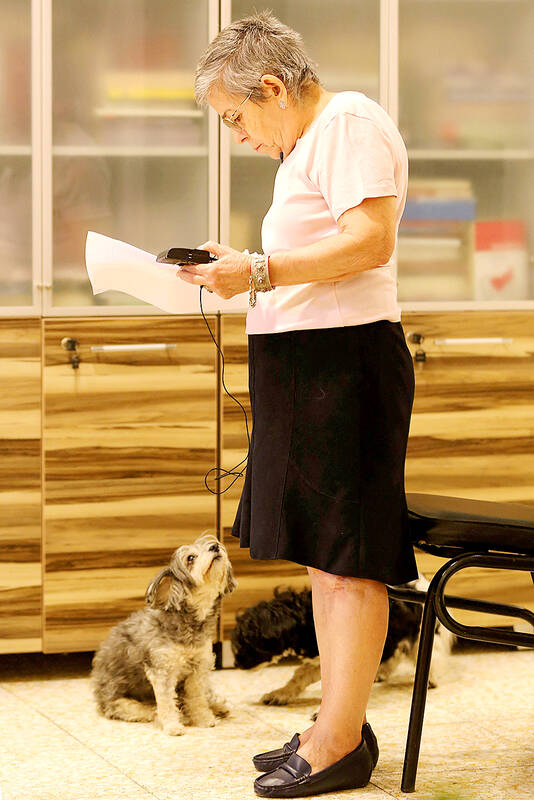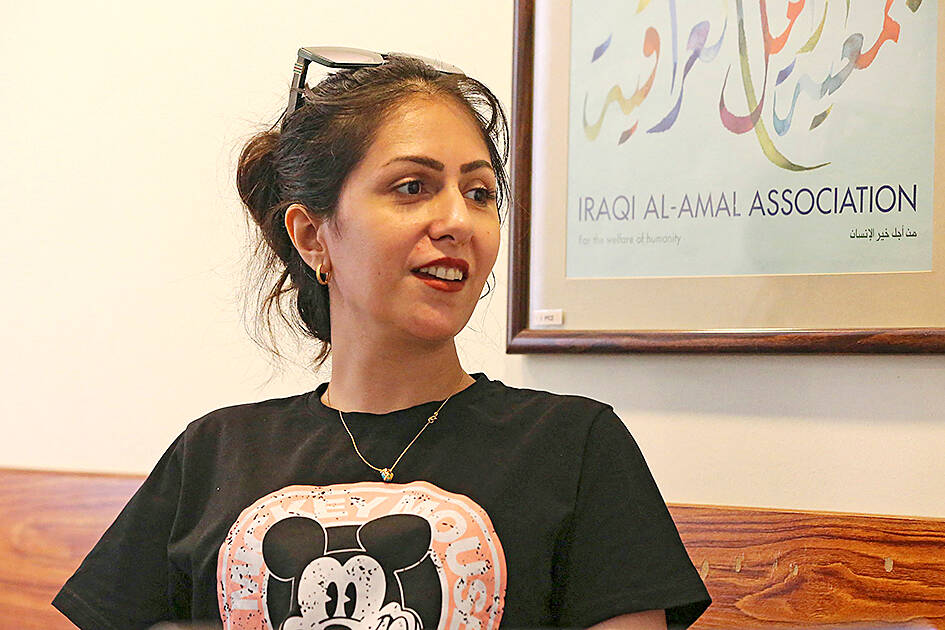Just a year into her marriage, Manal became one of the tens of thousands of Iraqis every year who divorce in a deeply conservative nation where breakup rates have risen.
For Manal, like many other women, the reason was clear — her husband’s financial dependence on his family’s business meant that “he couldn’t take any decisions of his own.”
The 33-year-old was divorced eight years ago from her husband, who is also her cousin and who worked for his father’s appliance shop.

Photo: AFP
Not only did he depend on his family for money, but the couple also cohabited with her in-laws.
“He wasn’t financially independent, which caused family problems,” she said.
Her reasoning echoes that of tens of thousands of Iraqis, data published by the Iraqi Supreme Judicial Council showed.

Photo: AFP
Iraqi authorities cite wider economic difficulties, early marriages and infidelity encouraged by new technologies as other key drivers of divorce rates.
More than 73,000 divorces were pronounced last year by the courts in the country of 42 million people, largely the same as the number in 2018.
This is up from an average of just below 51,700 per year over the period from 2004 to 2014, a decade that saw one in five marriages end in divorce, according to the council’s Web site.
A study published by the council on the causes of divorce cites “living with the spouse’s family, leading in many cases to negative interference in the relationship,” in tandem with “the spouse’s financial dependence on his family.”
It also cites difficulties finding employment and “infidelities due to the Internet.”
Premature — often child — marriages are also a driver of divorce. A total of 4,092 adolescent girls were divorced in the two years until the end of last year.
Veteran feminist Hanaa Edwar also cited “financial pressure on families” as a cause.
“This creates a psychological burden and problems,” she said.
Iraq was not spared the surge in domestic violence that came with the COVID-19 pandemic — though Edwar salutes women for increasingly finding the courage to leave.
“There is an awareness among women that if violence persists in their lives and their children’s lives, then it’s better to divorce,” she said.
However, in a deeply patriarchal society like Iraq, a divorced man and a divorced woman are not equal.
On top of the often arduous battle to gain custody over their children, women are frequently exposed to “sexual harassment” by men who believe they have the right to make sexual advances towards divorced women, Edwar said.
Some families even refuse to allow divorced women to work or go out freely, for fear of the “stigma” and what people would say.
“As for men — socially, everything is acceptable. Today, he divorces, tomorrow he remarries,” she said.
Nonetheless, statistics show that many women were undeterred.
“Courts have registered a rise in divorces, particularly over the past decade,” a magistrate was quoted as saying in 2019 on the judicial council’s Web site.
A social worker who sifts through divorce cases filed in courts so as to try to re-establish common ground between couples likewise acknowledges that “divorce has become much more common.”
Speaking on condition of anonymity at a Baghdad court, she said that “only in 10 percent of cases are we able to find a solution” and abandon the divorce proceedings.
Manal now lives back in her parents’ home and works for a feminist organization. Her nine-year-old son Adam sees his father from time to time.
Despite the letdown of her first marriage, she has not written off the possibility of remarrying, but says conditions must be met.
A future husband would have to accept her son, for one, but also her professional ambitions.
Her advice to younger generations of women about to embark on their matrimonial journey is simple: “Guarantee your economic independence and don’t get married too young.”
“You should wait, marriage shouldn’t be the sole ambition in life,” she said.

Eleven people, including a former minister, were arrested in Serbia on Friday over a train station disaster in which 16 people died. The concrete canopy of the newly renovated station in the northern city of Novi Sad collapsed on Nov. 1, 2024 in a disaster widely blamed on corruption and poor oversight. It sparked a wave of student-led protests and led to the resignation of then-Serbian prime minister Milos Vucevic and the fall of his government. The public prosecutor’s office in Novi Sad opened an investigation into the accident and deaths. In February, the public prosecutor’s office for organized crime opened another probe into

RISING RACISM: A Japanese group called on China to assure safety in the country, while the Chinese embassy in Tokyo urged action against a ‘surge in xenophobia’ A Japanese woman living in China was attacked and injured by a man in a subway station in Suzhou, China, Japanese media said, hours after two Chinese men were seriously injured in violence in Tokyo. The attacks on Thursday raised concern about xenophobic sentiment in China and Japan that have been blamed for assaults in both countries. It was the third attack involving Japanese living in China since last year. In the two previous cases in China, Chinese authorities have insisted they were isolated incidents. Japanese broadcaster NHK did not identify the woman injured in Suzhou by name, but, citing the Japanese

YELLOW SHIRTS: Many protesters were associated with pro-royalist groups that had previously supported the ouster of Paetongtarn’s father, Thaksin, in 2006 Protesters rallied on Saturday in the Thai capital to demand the resignation of court-suspended Thai Prime Minister Paetongtarn Shinawatra and in support of the armed forces following a violent border dispute with Cambodia that killed more than three dozen people and displaced more than 260,000. Gathered at Bangkok’s Victory Monument despite soaring temperatures, many sang patriotic songs and listened to speeches denouncing Paetongtarn and her father, former Thai prime minister Thaksin Shinawatra, and voiced their backing of the country’s army, which has always retained substantial power in the Southeast Asian country. Police said there were about 2,000 protesters by mid-afternoon, although

MOGAMI-CLASS FRIGATES: The deal is a ‘big step toward elevating national security cooperation with Australia, which is our special strategic partner,’ a Japanese official said Australia is to upgrade its navy with 11 Mogami-class frigates built by Japan’s Mitsubishi Heavy Industries, Australian Minister for Defence Richard Marles said yesterday. Billed as Japan’s biggest defense export deal since World War II, Australia is to pay US$6 billion over the next 10 years to acquire the fleet of stealth frigates. Australia is in the midst of a major military restructure, bolstering its navy with long-range firepower in an effort to deter China. It is striving to expand its fleet of major warships from 11 to 26 over the next decade. “This is clearly the biggest defense-industry agreement that has ever